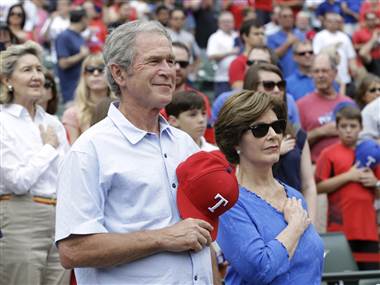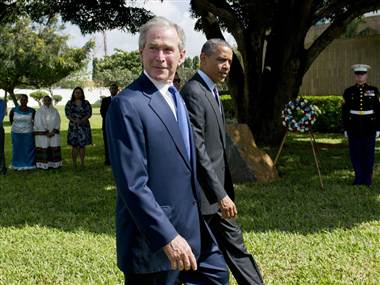George W. Bush will make a rare post-presidential foray into politics on Wednesday when he delivers a speech about immigration, thrusting himself into a contentious internal policy debate which has split the Republican Party he once led.

Lm Otero / AP
Former President George W. Bush, left, stands during the national anthem with his wife Laura Bush before a baseball game between the Kansas City Royals and Texas Rangers Saturday, June 1, 2013, in Arlington, Texas.
GOP lawmakers are already sending signals that his thoughts won’t sway them but immigration reform is one of the great unfinished items of Bush’s presidency. His words on the matter are all the more noteworthy considering how hesitant he has been to delve into politics since leaving office, preferring instead to pursue other activities, such as charity work and his new painting hobby.
But his absence from the public stage has been more than self-imposed. Republicans have often turned their backs on his two-term presidency since he left office highly unpopular in most polls. The former president has not been a staple on the campaign trail as many former presidents have been, and he was kept so far away from the 2012 campaign that his brother, former Florida Gov. Jeb Bush, was left to defend his record and legacy at last year’s Republican convention.
Largely because of that history, Bush’s sentiments don’t appear to matter much to many House Republicans, who now control the fate of comprehensive immigration reform and will huddle behind closed doors to plot their path forward on the issue the same day Bush speaks at a naturalization ceremony at his presidential library in Texas. They’ve already signaled that Bush won’t have much impact on their deliberations of a bipartisan bill passed by the Senate last month.
It’s unclear precisely what Bush will say in his remarks but in a recent interview he reiterated his view that it is “very important to fix a broken system, to treat people with respect and have confidence in our capacity to assimilate people.”
Rep. Tim Griffin, an Arkansas Republican who served as a political aide in the Bush White House, flatly said “no” when asked whether his former boss’s words would weigh on his or other Republicans’ thinking on immigration.
Archive Video: Speaking about immigration reform during his 2007 State of the Union address, President Bush says, “We should establish a legal and orderly path for foreign workers to enter our country to work on a temporary basis.”
“We represent our constituents. I think he’s a great man, and I respect him greatly,” Griffin said. “But I’ve got 85 to 95 percent of constituents’ calls to my office against the Senate bill every week.”
The battle over comprehensive immigration reform into which Bush is wading is just the latest and broadest example of the internal battle over the trajectory of the GOP. It’s a fight pitting dogged, grassroots conservatives against establishment Republicans who worry that itinerant conservatism will irreparably harm the party – in this case, with the increasingly influential bloc of Hispanic voters.
Bush’s remarks during a naturalization ceremony at his presidential library could ostensibly break through that rift.
A number of Republicans in Congress have come to Washington in the elections since Bush left office, and the party’s identity is more tied into opposing President Barack Obama than celebrating the legacy of Obama’s predecessor. But the fight over comprehensive immigration reform during the Bush administration in many ways presaged the GOP’s struggles with Hispanic voters since conservatives drove the Republican president’s immigration proposals into the ground in 2007.
Republican proponents of comprehensive immigration reform argue that conservatives would be well-served to tune into Bush’s remarks on Wednesday.
“I think it’s a reminder that he, a Republican president, tried so hard to get immigration done and it is unfinished business for him,” Ana Navarro, a prominent Republican advocate of immigration reform, said of Bush’s speech. “And I suspect that it won’t be lost on some of the bigger thinkers in the GOP that the guy giving the speech was the last Republican to win the presidency and did it with 44 percent of the Hispanic vote.” (An NBC News analysis determined that Bush won 40 percent of the Latino vote in the 2004 election, still up considerably from John McCain’s 31 percent in 2008 and Mitt Romney’s 27 percent in 2012.)
“No, he’s not going to sway Steve King,” she added, referring to the hardline Iowa conservative congressman. “But yes, his voice will make a difference to some and it’s the right thing for him to do.”
Bush’s counsel for Republicans in his ABC interview was understated. “Good policy yields good politics, as far as I’m concerned,” the former president said.
Not that Bush’s endorsement of the Senate immigration reform law, which passed last month with bipartisan support, would necessarily make a difference.
“I’ll take the hypothetical. If he were to come out for the Senate bill, in all due respect, I would say he’s wrong,” said Griffin.

Saul Loeb / AFP – Getty Images
President Barack Obama and former President George W. Bush arrive on July 2, 2013 for a wreath-laying ceremony for the victims of the 1998 U.S. Embassy bombing at the Bombing Memorial in Dar Es Salaam, Tanzania.
It doesn’t help that Bush’s cachet among conservatives had steadily eroded over the course of his second term. Mike Needham, the head of the conservative Heritage Action for America (which opposes the Senate-passed immigration reform proposal), said that after mounting government spending and Bush’s failed Supreme Court nomination of Harriet Miers, “the immigration bill did nothing to enamor the base to President Bush.”
“I think there’s a strong sense among the conservative base that fundamentally the deck is stacked against people across the country and in favor of special interests,” he said.
And to the extent that Bush’s arguments threaten to fall largely upon deaf ears, it reflects the drastic shifts in the GOP over the course of just a few years. The balance of power now favors groups like Heritage Action rather than one of the two surviving former Republican presidents.
“Fundamentally, where the Republican establishment misses the boat is that people just don’t trust Washington,” Needham said.
Related:
- Slideshow: The legacy of George W. Bush
- After Senate immigration marathon, House signals narrow path
- GOP wrestles with immigration reform consequences
This story was originally published on Wed Jul 10, 2013 3:42 AM EDT
Source Article from http://firstread.nbcnews.com/_news/2013/07/09/19378754-rare-bush-policy-foray-may-fall-on-deaf-gop-ears?lite&ocid=msnhp&pos=1
Immigration fight pulls Bush back into politics
http://firstread.nbcnews.com/_news/2013/07/09/19378754-rare-bush-policy-foray-may-fall-on-deaf-gop-ears?lite&ocid=msnhp&pos=1
http://news.search.yahoo.com/news/rss?p=immigration
immigration – Yahoo! News Search Results
immigration – Yahoo! News Search Results
